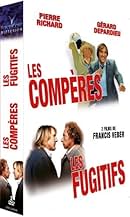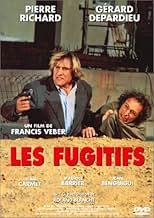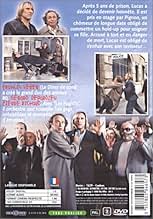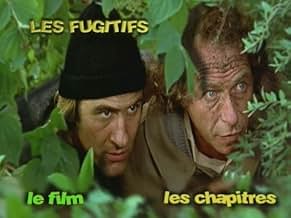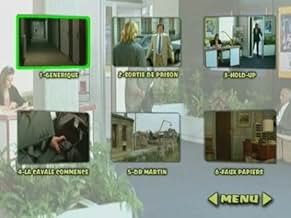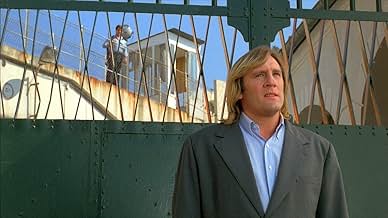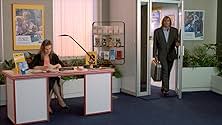Les fugitifs
- 1986
- 1h 35min
CALIFICACIÓN DE IMDb
7.0/10
8.4 k
TU CALIFICACIÓN
Un atracador estúpido toma a Jean como rehén en un atraco a un banco. Como Jean salió de la cárcel una hora antes, la policía asume que él es el ladrón. Todo sale cómicamente mal. La hija pe... Leer todoUn atracador estúpido toma a Jean como rehén en un atraco a un banco. Como Jean salió de la cárcel una hora antes, la policía asume que él es el ladrón. Todo sale cómicamente mal. La hija pequeña del ladrón se une a los fugitivos.Un atracador estúpido toma a Jean como rehén en un atraco a un banco. Como Jean salió de la cárcel una hora antes, la policía asume que él es el ladrón. Todo sale cómicamente mal. La hija pequeña del ladrón se une a los fugitivos.
- Premios
- 2 nominaciones en total
- Dirección
- Guionista
- Todo el elenco y el equipo
- Producción, taquilla y más en IMDbPro
Opiniones destacadas
I am glad to see, that the rating of the movie stands at an exact 7.0/10, well at the time of writing this review anyway. It is exactly how I feel about the movie. Based on the trailers, I've exepcted an absurd comedy and it is what I got, in the first half anyway. The second half of the movie, while still having it's funny moments, deals more with a parental drama of the strugling single dad who was pushed into the robery.
It might be the case, that with some time to reflect on the movie I might increase the rating, because the later part did give the movie heart. The bottom line is, I did not feel like the movie was excellent when I finished watching it, only OK/pretty good. Having that said I can fully recomend viewing it, while it is indeed a good time.
It might be the case, that with some time to reflect on the movie I might increase the rating, because the later part did give the movie heart. The bottom line is, I did not feel like the movie was excellent when I finished watching it, only OK/pretty good. Having that said I can fully recomend viewing it, while it is indeed a good time.
10Slick-50
Pierre Richard and Gerard Depardieu reteam to star in this dynamite comedy about an ex-con (Depardieu) who has just been released from the slammer when he is taken hostage by bumbling robber (Richard) during a moronic bank heist which the robber hopes will help find a cure for his daughter who hasn't spoken since her mother died, three years ago. When the plug is pulled on Richard's bank heist, the police are summoned and Depardieu, out of the many hostages in the bank at the time, is selected to be the robber's ticket out without a shot being fired, but then, of course, the cops think Depardieu is pulling the heist and the two become fugitives. There is only one way out of this fine mess: cross the border, which is exactly what they do in what is potentially the funniest scene in film history. The two men pose as husband and wife (Richard wears a wig, of course), and his daughter's hair is cut and she poses as the son, but crossing the border isn't as easy as it was originally made out to be. Richard's daughter thinks she is going to vomit and Richard shows her how, by sticking his head out the window, thus losing the wig, which is flattened by a passing truck. Everything is back to normal after having retrieved the wig, but Richard is then mistaken for a pregnant woman and is rushed to hospital by roadblocking police. All fits in nicely in what is a modern comic gem.
"The Fugitives" marks Francis Veber's last collaboration with the Pierre Richard – Gérard Depardieu duo and the last opus of an unofficial trilogy that started with "The Goat". For information, the second one, "ComDads" earned a César nomination for Gérard Depardieu in the Best Actor category and one for Veber for Best Screenplay. "The Fugitives"'s screenplay was also César-nominated, so was the performance of Jean Carmet for Best Supporting Actor, and if not better than "The Goat", the film beautifully concludes the misadventures of the oddest yet most defining duos of French Comedy.
Indeed, the 60's had Louis de Funès and Bourvil, the hot-tempered middle-aged man and the lovable idiot, the 80's would have Pierre Richard and Gérard Depardieu, the likable loser and the no-nonsense tough guy, a formula that proved to be successful in the three movies. The word 'formula' is less meant to diminish Veber 's creativity than to highlight his writing talent, as he builds similar plots from totally different situations and manage to make something fresh out of a usual comical material, which mostly relies on the opposition between the two leads leading to some chaotic situations, but it's only from Veber's chaos that something positive can finally rise.
In the first two movies, Depardieu and Richard were hired to look for someone who disappeared, the unlucky daughter of a rich businessman, the runaway son of an ex-youth's love, and at the end a very precious lesson about life and acceptance predominated the resolution of the plot. In "The Fugitives", the plot begins with a more dramatic tone. Depardieu plays Lucas, an ex-bank robber released from jail after a five-year sentence and Richard is François Pignon, an unemployed widower, and the father of a 6-year old little daughter, pushed by circumstances to accomplish one of the most pathetic bank robberies that ever disgraced the silver screen, so he can get the money to flee, otherwise his sickly daughter Jeanne, would be put in an orphan. There is a strange and cleverly written parallel between Lucas and Pignon, one is an ex-criminal who wants to go straight while the other, although well-intentioned, becomes a criminal. Talk about a perfect timing to meet each other.
Indeed, the plot reveals its clever intricacy when Pignon decides to take one hostage and of course, his eyes go immediately to Lucas who only came to open an account and put the money he got from selling his gold watch. Right before the robbery, we see Lucas harassed by the Police Chief who counts on another arrest for his promotion, but Depardieu, with a remarkable talent, beautifully embodies the sincerity of a man who wants to get straight and means it. So when he's chosen as the hostage, aware of the confusion it will place in the Chief's mind, he gently whispers "can't you take another?" Of course, there would have been no story if Pignon followed his advice. Naturally, Pignon disobeys and what comes next confirms Lucas' fears as he's forced to play the robber for his own safety. Accidentally shooting at his leg when they try to escape, Pignon puts the ill-fated Lucas in a situation where he will have to depend on him for a while. The story takes off.
Pignon sends Lucas to Jean Carmet; a doctor who happens to be more competent with animals, one of the film's best moments when he talks to him as if he was a dog (probably lost in translation, because the word for 'bullet' is the same as 'ball') However, the middle act of the film strikes by a certain dryness of gags, and a storyline getting more serious and more pathetic. The name 'Pignon' doesn't epitomize the idea of the lovable loser that would become a character's trademark in most Veber movies, this time, the film is borderline a poignant drama. But while Pignon struggles to get the papers and ask for a corrupt individual named Lahbib to help him, another storyline develops in a slow but beautiful way. Lucas lies in the doctor's bed and Jeanne takes care of film, she doesn't speak a word since her mother died. Lucas' contempt for Pignon is constant during the two thirds of the film but it's compensated by the growing fondness he has on Jeanne. The little girl is convincing in the role of a sad wounded heart and plays as the perfect 'third' emotional link for the duo.
And it's not surprising that she would play a very pivotal role in the evolution of Lucas and Pignon's, friendlier in what seems to be a farewell scene, beautifully written by Francis Veber. She found a great fatherly figure in Lucas, possessing whatever is lacking in his father, and she can imagine having a future with both of them. Maybe the film suffers from too much emotionality that distracts from its original comedic purpose and I might agree with that, except that "The Fugitives" totally redeems itself in the last twenty minutes. The final act of "The Fugitives" is on the same level of comedic genius as "The Goat", even better sometimes, in fact, it gets funnier one scene after another with a level of slapstick and comedy of situation you wouldn't have expected after such a dramatic set-up. Maybe the film got too emotional at some parts, but the pay-off was worth it. And at least, it didn't forget to be a comedy.
"The Fugitives" is the cinematic proof that the effect a film can have on you mostly depends on the last part, that's why it should be judged till the end to be properly judged, and at the end, it's impossible to resist to this trio, this good-hearted bear, this funny-looking clown and this adorable little girl. The film beautifully balance between laughs and emotion until a magnificent finale transcended by Wladimir Cosma's score, one of his best, while we see the duo disappearing in the landscape, for the last time.
Indeed, the 60's had Louis de Funès and Bourvil, the hot-tempered middle-aged man and the lovable idiot, the 80's would have Pierre Richard and Gérard Depardieu, the likable loser and the no-nonsense tough guy, a formula that proved to be successful in the three movies. The word 'formula' is less meant to diminish Veber 's creativity than to highlight his writing talent, as he builds similar plots from totally different situations and manage to make something fresh out of a usual comical material, which mostly relies on the opposition between the two leads leading to some chaotic situations, but it's only from Veber's chaos that something positive can finally rise.
In the first two movies, Depardieu and Richard were hired to look for someone who disappeared, the unlucky daughter of a rich businessman, the runaway son of an ex-youth's love, and at the end a very precious lesson about life and acceptance predominated the resolution of the plot. In "The Fugitives", the plot begins with a more dramatic tone. Depardieu plays Lucas, an ex-bank robber released from jail after a five-year sentence and Richard is François Pignon, an unemployed widower, and the father of a 6-year old little daughter, pushed by circumstances to accomplish one of the most pathetic bank robberies that ever disgraced the silver screen, so he can get the money to flee, otherwise his sickly daughter Jeanne, would be put in an orphan. There is a strange and cleverly written parallel between Lucas and Pignon, one is an ex-criminal who wants to go straight while the other, although well-intentioned, becomes a criminal. Talk about a perfect timing to meet each other.
Indeed, the plot reveals its clever intricacy when Pignon decides to take one hostage and of course, his eyes go immediately to Lucas who only came to open an account and put the money he got from selling his gold watch. Right before the robbery, we see Lucas harassed by the Police Chief who counts on another arrest for his promotion, but Depardieu, with a remarkable talent, beautifully embodies the sincerity of a man who wants to get straight and means it. So when he's chosen as the hostage, aware of the confusion it will place in the Chief's mind, he gently whispers "can't you take another?" Of course, there would have been no story if Pignon followed his advice. Naturally, Pignon disobeys and what comes next confirms Lucas' fears as he's forced to play the robber for his own safety. Accidentally shooting at his leg when they try to escape, Pignon puts the ill-fated Lucas in a situation where he will have to depend on him for a while. The story takes off.
Pignon sends Lucas to Jean Carmet; a doctor who happens to be more competent with animals, one of the film's best moments when he talks to him as if he was a dog (probably lost in translation, because the word for 'bullet' is the same as 'ball') However, the middle act of the film strikes by a certain dryness of gags, and a storyline getting more serious and more pathetic. The name 'Pignon' doesn't epitomize the idea of the lovable loser that would become a character's trademark in most Veber movies, this time, the film is borderline a poignant drama. But while Pignon struggles to get the papers and ask for a corrupt individual named Lahbib to help him, another storyline develops in a slow but beautiful way. Lucas lies in the doctor's bed and Jeanne takes care of film, she doesn't speak a word since her mother died. Lucas' contempt for Pignon is constant during the two thirds of the film but it's compensated by the growing fondness he has on Jeanne. The little girl is convincing in the role of a sad wounded heart and plays as the perfect 'third' emotional link for the duo.
And it's not surprising that she would play a very pivotal role in the evolution of Lucas and Pignon's, friendlier in what seems to be a farewell scene, beautifully written by Francis Veber. She found a great fatherly figure in Lucas, possessing whatever is lacking in his father, and she can imagine having a future with both of them. Maybe the film suffers from too much emotionality that distracts from its original comedic purpose and I might agree with that, except that "The Fugitives" totally redeems itself in the last twenty minutes. The final act of "The Fugitives" is on the same level of comedic genius as "The Goat", even better sometimes, in fact, it gets funnier one scene after another with a level of slapstick and comedy of situation you wouldn't have expected after such a dramatic set-up. Maybe the film got too emotional at some parts, but the pay-off was worth it. And at least, it didn't forget to be a comedy.
"The Fugitives" is the cinematic proof that the effect a film can have on you mostly depends on the last part, that's why it should be judged till the end to be properly judged, and at the end, it's impossible to resist to this trio, this good-hearted bear, this funny-looking clown and this adorable little girl. The film beautifully balance between laughs and emotion until a magnificent finale transcended by Wladimir Cosma's score, one of his best, while we see the duo disappearing in the landscape, for the last time.
When Gérard Depardieu gets released from prison, he vows to go straight. It's a very unlucky break for him when that same day, he's an innocent bystander in a bank robbery. The robber, Pierre Richard, takes a hostage so he can flee the bank, and by sheer coincidence, he takes Gérard. The police think Gérard has taken Pierre hostage, since he's the known criminal, and Gérard's dreams of living the straight-and-narrow go up in flames.
While most of the movie is a very cute comedy, with two different men thrown together and eventually finding common ground and friendship, there's another layer of the movie that's sweet and touching. Pierre has a young daughter, Anaïs Bret, who hasn't spoken since her mother died, and while his actions aren't according to the law, it's easy to see why he does them. She's such a doll, and her loyalty and innocence soften both the leads. There's an adorable scene where Gérard collapses from pain and blood loss after running from the police on an injured leg. He's exposed and unconscious, and little Anaïs runs after him, then sits beside him as a watchdog to make sure no one else hurts him. She stays with him all night, eventually curling up beside him and falling asleep in his arms. After that scene, the audience will wholeheartedly approve of anything the two "fugitives" do because they know they're doing it for her.
I love this movie, because both Gérard and Pierre put their hearts on their sleeves in front of the camera. Tension relies on emotion, and there's plenty of both in this movie. If this sounds good to you but you don't think you can handle the subtitles, there was an American remake in 1989 with Nick Nolte and Martin Short. I loved this version, since Gérard Depardieu is one of my favorite celebrity boyfriends. With his feathery blond hair, his vulnerable eyes, and his sensitive smile, I don't think I've ever seen him looking more gorgeous. I'll probably have to watch the movie again, since I was too busy drooling over him to read every single subtitle.
While most of the movie is a very cute comedy, with two different men thrown together and eventually finding common ground and friendship, there's another layer of the movie that's sweet and touching. Pierre has a young daughter, Anaïs Bret, who hasn't spoken since her mother died, and while his actions aren't according to the law, it's easy to see why he does them. She's such a doll, and her loyalty and innocence soften both the leads. There's an adorable scene where Gérard collapses from pain and blood loss after running from the police on an injured leg. He's exposed and unconscious, and little Anaïs runs after him, then sits beside him as a watchdog to make sure no one else hurts him. She stays with him all night, eventually curling up beside him and falling asleep in his arms. After that scene, the audience will wholeheartedly approve of anything the two "fugitives" do because they know they're doing it for her.
I love this movie, because both Gérard and Pierre put their hearts on their sleeves in front of the camera. Tension relies on emotion, and there's plenty of both in this movie. If this sounds good to you but you don't think you can handle the subtitles, there was an American remake in 1989 with Nick Nolte and Martin Short. I loved this version, since Gérard Depardieu is one of my favorite celebrity boyfriends. With his feathery blond hair, his vulnerable eyes, and his sensitive smile, I don't think I've ever seen him looking more gorgeous. I'll probably have to watch the movie again, since I was too busy drooling over him to read every single subtitle.
10OMTR
"The Fugitives" (1986) is the third collaboration of the famous trio composed by Francis Veber, Gérard Depardieu and Pierre Richard, after "Knock on Wood" (1981) and "The ComDads" (1983).
It benefits from all the know-how of this blessed era. Starting with the talent of Francis Veber who, as a complete author, wrote and directed the film, then with the masterful acting performances of Gérard Depardieu, Pierre Richard, the adorable and phenomenal little Anaïs Bret, then 6 years old, as well as Jean Carmet. So many elements that perpetuate all the magic of the French comedy of the 1980s. All set to music with a new sublime soundtrack by Vladimir Cosma.
This film is carried by a tenderness and a humanity that no longer exist today, and only reinforces our nostalgia for a bygone century, where even some convicts could have a big heart.
It benefits from all the know-how of this blessed era. Starting with the talent of Francis Veber who, as a complete author, wrote and directed the film, then with the masterful acting performances of Gérard Depardieu, Pierre Richard, the adorable and phenomenal little Anaïs Bret, then 6 years old, as well as Jean Carmet. So many elements that perpetuate all the magic of the French comedy of the 1980s. All set to music with a new sublime soundtrack by Vladimir Cosma.
This film is carried by a tenderness and a humanity that no longer exist today, and only reinforces our nostalgia for a bygone century, where even some convicts could have a big heart.
¿Sabías que…?
- TriviaFrancis Veber: [François Pignon] features a likeable idiot called François Pignon.
- ConexionesFeatured in Francis Veber artisan du rire: La saga Pignon (2001)
Selecciones populares
Inicia sesión para calificar y agrega a la lista de videos para obtener recomendaciones personalizadas
- How long is The Fugitives?Con tecnología de Alexa
Detalles
- Tiempo de ejecución1 hora 35 minutos
- Mezcla de sonido
- Relación de aspecto
- 1.66 : 1
Contribuir a esta página
Sugiere una edición o agrega el contenido que falta

Principales brechas de datos
By what name was Les fugitifs (1986) officially released in Canada in English?
Responda
![Ver Bande-annonce [OV]](https://m.media-amazon.com/images/M/MV5BMjk4ZGU5MTgtZDQ0Yi00YTQ3LThmZjctYWM2NTc2YmI1ZGJjXkEyXkFqcGdeQXRyYW5zY29kZS13b3JrZmxvdw@@._V1_QL75_UX500_CR0)

